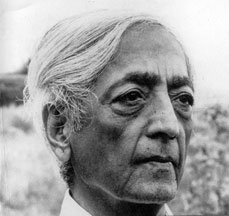JK: Not your regular sage
.jpg) Jiddu Krishnamurti (JK) was an extraordinary philosopher who sprang
to prominence in the 20th century. He has been ranked alongside Ramana
Maharishi. His life and teachings are awe-inspiring. However, even those
who listened to his discourses complain that he is beyond comprehension.
This is partly true if you are new to philosophy. You have to read his
books several times to understand what he says. Jiddu Krishnamurti (JK) was an extraordinary philosopher who sprang
to prominence in the 20th century. He has been ranked alongside Ramana
Maharishi. His life and teachings are awe-inspiring. However, even those
who listened to his discourses complain that he is beyond comprehension.
This is partly true if you are new to philosophy. You have to read his
books several times to understand what he says.
Although Krishnamurti is no longer among the living, his books keep
on appearing and reappearing in reputed bookshops and Krishnamurti
Centres in many countries are popularising his philosophy. The latest
book published by the Krishnamurti Foundation in India is The
Transformation of Man, subtitled The Wholeness of Life.
Many books, particularly The Years of Awakening, have traced the
almost fairytale life of JK who was born into a Brahmin family in India.
His unusual ascent from an innocent boy to be a great philosopher is a
story in itself. Theosophist Annie Besant and E. W. Leadbeater brought
him up in England. He was looked upon as the World Leader the people
were waiting for. True to his character, Krishnamurti renounced such
honours and asked people not to follow him! Instead JK wanted everybody
to be a light unto themselves.
Spiritual progression
Although JK did not wish to be a religious leader, people saw in him
a kind of spiritual progression from his young days. It is said that he
underwent a psychical cleansing while he was living in Ojai, California.
He led a purely spiritual life and came to be respectfully referred to
as “Krishnaji”.
 |
|
Jiddu Krishnamurti |
Despite his rejection of being a spiritual leader, JK blossomed into
a religious teacher who spoke to millions of people in different parts
of the world. People wanted to be his disciples or at least followers,
but Krishnamurti categorically said that he had no followers. However,
people flocked in their thousands to listen to his discourses which were
addressed to man’s intellect. It took some time for people to understand
what he said. For instance, once he said, “You are the world and the
world is you.”
JK was an extraordinary human being but people thought that he was a
god or a Buddha. But he told the people that what was important was the
message and not the messenger! Still people flocked around him seeking
his guidance. Unfortunately, they did not believe that he was an
ordinary man and continued to deify him.
Salvation
While theosophists and others expected salvation from him, JK lived
like any other man with his own brand of foibles. One of his ardent
followers - Mary Lutyens - said that Krishnamurti was a human being full
of “adorable quirks”. What is so strange is that JK made a genuine
effort to express the inexpressible. He wanted the people to see what he
saw from the mountain top!
Krishnamurti has shown us the way to lead a happy life without
friction with fellow human beings. His dialogues and discourses are full
of wit and humour, but the message is loud and clear: “Live your life
naturally, easily and free from conflict and violence.”
The Transformation of Man begins with seven dialogues between JK and
Dr David Bohm, Professor of Theoretical Physics at Birkbeck College,
University of London and Dr David Shainberg, a psychiatrist of New York
City. These dialogues contain unusual aspects of his life. As a great
philosopher he explores the reasons why mankind has lived for millennia
in chaos and misery. In his public talks Krishnamurti points out that
the mind is unceasingly occupied with thinking. As a result, it has lost
touch with its original unconditioned freedom.
Complex structure
Perhaps one of the most illuminating talks he delivered is on “How is
one to know oneself?” He says, “Oneself is a very complex structure, a
very complex movement, how is one to know oneself so that one does not
deceive oneself? One can only know oneself in one’s relationship to
others.
In one’s relationship to others one may withdraw from them because
one does not want to be hurt and in relationship one may discover that
one is jealous, dependent, attached and really quite callous.”
Krishnamurti has addressed almost all the pressing problems of man.
His discourses on death, intelligence, mind, suffering, sorrow, fear,
consciousness and conflict are illuminating. Although a beginner may
experience some difficulty in understanding what he says, persistent
reading will unravel the mystery of his words. He is not the sage who
gives commands or only theories to mull over. Because of this fact
Krishnamurti does not become your regular sage!
|

